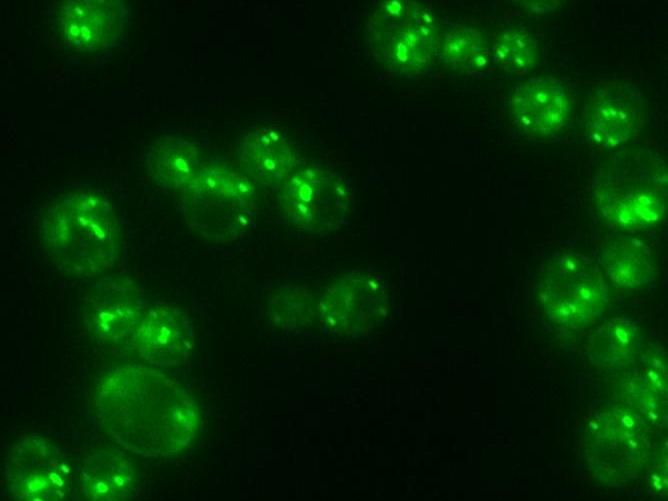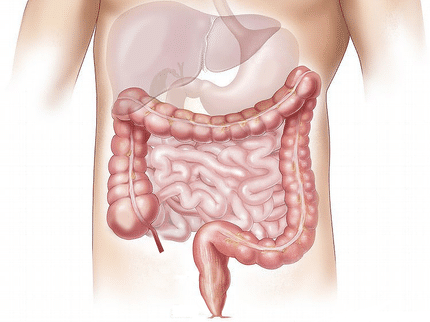A fat-regulating enzyme could hold the key to diseases
Including obesity, diabetes, cancer and other
It had already been known that the enzyme known as phosphatidic acid phosphatase plays a crucial role in regulating the amount of fat in the human body. Controlling it is therefore of interest in the fight against obesity.

Fat is stored in lipid droplets (bright green spots) in yeast cells, which is analogous to how fat is stored in human tissue.
Gil-Soo Han/Rutgers University-New Brunswick
But scientists at Rutgers University-New Brunswick have now found that getting rid of the enzyme entirely can increase the risk of cancer, inflammation and other ills.
"The goal of our lab is to understand how we can tweak and control this enzyme," said George M. Carman, Board of Governors professor in the Department of Food Science in the School of Environmental and Biological Sciences. "For years, we have been trying to find out how to fine-tune the enzyme's activity so it's not too active, and creating too much fat, but it's active enough to keep the body healthy."
The enzyme was discovered in 1957 and Gil-Soo Han, research assistant professor in the Rutgers Center for Lipid Research, discovered the gene encoding the enzyme in 2006. The enzyme determines whether the body's phosphatidic acid will be used to create fat, or create the lipids in cell membranes.
The study used baker's yeast as a model organism, since it also contains the key enzyme. Han, study lead author, deleted a gene in yeast to eliminate the enzyme. That led to accumulations of phosphatidic acid, with cells making far more membrane lipids than necessary, said Carman, who founded the center in Rutgers' New Jersey Institute for Food, Nutrition, and Health a decade ago.
"We have found that maybe a more critical role for the enzyme is to make sure that cells are not making too much membrane lipid," Carman said. "If you make too much membrane lipid, you make too much membrane and the cells are permitted to grow uncontrollably, a condition characteristic of cancer."
Since the discovery of the gene encoding the enzyme, people worldwide have studied the enzyme because of its relation to obesity, lipodystrophy, inflammation, diabetes and other conditions, Carman said.
Lately, the Rutgers scientists have been trying to understand the enzyme's structure and function. The next step is to figure out how to control it, Carman said.
"The key take-home message is that things have to be balanced," he said. "To keep the balance between making storage fat and membrane lipid, you have to have balanced diet."
Original publication
Other news from the department science

Get the life science industry in your inbox
By submitting this form you agree that LUMITOS AG will send you the newsletter(s) selected above by email. Your data will not be passed on to third parties. Your data will be stored and processed in accordance with our data protection regulations. LUMITOS may contact you by email for the purpose of advertising or market and opinion surveys. You can revoke your consent at any time without giving reasons to LUMITOS AG, Ernst-Augustin-Str. 2, 12489 Berlin, Germany or by e-mail at revoke@lumitos.com with effect for the future. In addition, each email contains a link to unsubscribe from the corresponding newsletter.






















































